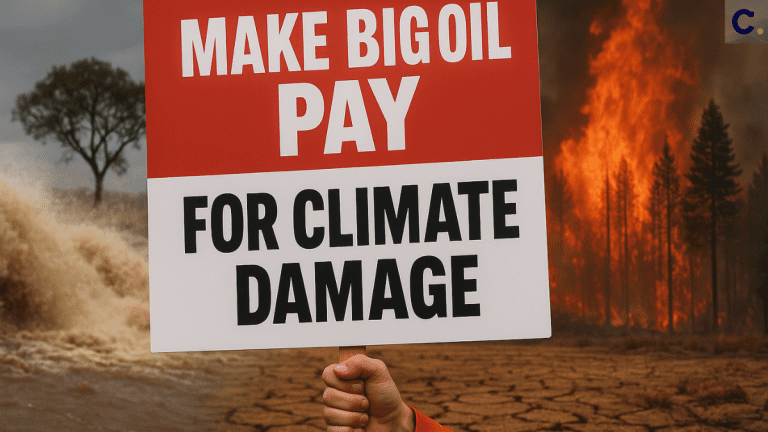
Climate change damage should be paid for by fossil fuel companies, according to a recent global study. These companies produce coal, oil, and gas—the main sources of pollution causing global warming.
People Say Fossil Fuel Companies Must Pay
The survey included people from 13 different countries. A massive 81% of them said fossil fuel companies should be taxed for the destruction linked to their pollution.
People everywhere are feeling the effects of climate change. Powerful storms destroy homes. Long droughts ruin crops. Floods wash away towns. Wildfires burn forests and communities. Many now believe big oil and gas companies are responsible for making these disasters worse. They want these companies to take responsibility and pay for the harm.
This demand for justice is growing louder. People are no longer believing the promises and ads from fossil fuel companies. They know these companies have polluted the planet for decades while making billions in profit.
Global Survey Reflects United Voices
The survey included about 1,200 people in each of 13 countries: Brazil, Canada, France, Germany, India, Italy, Kenya, Mexico, the Philippines, South Africa, Spain, the United Kingdom, and the United States. Together, these countries make up nearly half the world’s population. Despite their different locations and languages, the message from the people was the same—make the polluters pay.
Support for this idea was strong in every country. People believe it’s only fair that those who cause the problem help fix it. Poorer communities suffer the most from floods, droughts, and heatwaves. Yet, they are the least responsible for climate change. Taxing the companies that caused the crisis could help fund repairs, food support, and emergency housing.
The survey also found that 86% of people support using money from these taxes to help the most affected communities. People want the funds to go toward rebuilding after disasters and helping families stay safe.
Some Governments Start to Act on Climate Damage
In the United States, some states have already started taking steps. In 2024, Vermont became the first state to enact a “Superfund” statute addressing climate change. This law holds fossil fuel firms accountable for damages caused by climate change. A similar law was passed in New York later that year. Other states are already thinking about following suit.
Millions Vanish as Louisiana Oil Chief Brian Owen Admits to Federal Fraud—Judge Lowers the Boomme
These laws work like this: when a storm, fire, or flood hits, and it’s made worse by climate change, the companies that contributed to the pollution pay part of the clean-up cost. This means less burden on taxpayers and more help for those in need.
More lawmakers are beginning to see public support for these rules. They understand that people are tired of watching fossil fuel companies cause harm and walk away without paying for the damage. The push to hold them accountable is growing.
Global Climate Talks Highlight Tax Proposal
The survey results came out during a big climate meeting in Bonn, Germany. At this meeting, governments from many countries are discussing how to raise money to fight climate change. They need money to help countries in the Global South, where people are often the most affected by extreme weather.
The goal is to raise at least $1.3 trillion every year by 2035. That money would go toward reducing emissions, preparing for future disasters, and fixing the damage already done. There is already a promise of $300 billion per year, but many people say that is not enough.
One popular idea is to place new taxes on oil, gas, and coal companies. These taxes could raise money quickly. They would also send a message—if you pollute, you pay.
This idea has strong public backing. People want to stop giving fossil fuel companies a free pass. They want the money collected from these taxes to go to people on the frontlines of the climate crisis.
The survey shows that the public supports this plan. The message is clear across continents and cultures. People want climate justice. They want the polluters to take responsibility. And they want the money to help those hit hardest by this global emergency.